
10 minute read
Cover Story







Six months into the merged association, we’re pleased at how effectively
the Farm Credit East and Yankee Farm Credit teams have joined together to serve our customers. This continuity of service could be attributed to the many similarities our associations already had in common — from our alignment on Farm Credit’s mission and vision, to the types of customer businesses each association served.
As Sam Lincoln, one of the Vermont producers you’ll meet later in this article, stated, “Post merger, my convenient access to responsible credit has continued seamlessly — and that’s been really important to me. When I see an opportunity to make a move in the business, knowing that my lender is a text, phone call or email away, and that they won’t allow me to wade over my head is a huge asset to my business.”
As Farm Credit East moves forward, we aim to continue to provide reliable credit and valuable fi nancial services, while utilizing our expanded skill set and resources to grow our relationship with existing customers and those new to the industry.
In the following pages, meet some of the new faces from the Northern Region. We’ll feature several agriculture and forestry operations in Vermont along with a few of our new teammates. You’ll most likely notice the similarities in the agricultural commodities and business operations of our customers, as well as our expanded team’s consistent approach and unwavering commitment to serving our customers.
We look forward to providing networking opportunities for customers across our service area to glean value-added insights to enhance their businesses. Learn more about this fall’s regional customer meetings on this issue’s back cover.



A Glimpse Into the New Northern Region


Earlier this year, Farm Credit East was pleased to join with Yankee Farm Credit to enhance our service to Northeast agriculture, commercial fi shing and forest products now, and into the future. Entering into this merger were two like-minded associations that had partnered together on a number of programs over many years, and what has emerged is a strong cooperative committed to the future of Northeast agriculture.


Farm Credit East Snapshot
An Overview of the Industries Farm Credit East Serves across Vermont
$9.5 billion in loan commitments to Northeast agriculture. Serving over 18,000 customers across our eight-state territory. Customer-owners were paid $100.1 million in patronage dividends in 2022.
In excess of 70% market share of commercial farm lending across eight Northeast states.
With the top industries served in the former Yankee Farm Credit territory being dairy and timber, the makeup of the state’s agriculture closely aligns to that of the rest of Farm Credit East’s territory.
Dairy - 45% Forest Products - 15% Cash Field - 4% Livestock - 7% Farm Service - 4% Fruit - 3% Vegetables - 3% Country Home - 1% Nursery - 1% Maple Syrup - 14% All Other - 4% Dedicated staff of 575 agricultural specialists, each expert in the unique characteristics of Northeast agricultural industries.
Sam Lincoln received his fi rst new chainsaw on his 12th birthday. Growing up, he enjoyed working in the woods with his dad on his family’s dairy farm. Logging became a natural companion business to his seasonal cash crop operation. However, after consulting with retired Farm Credit East consultant Rick Hermonot through the Vermont Farm & Forest Viability Program in the mid-2000s, the primary business enterprise transitioned to full-time, year-round logging in 2012. Today, Lincoln Farm Timber Harvesting is a fully mechanized whole-tree logging operation.
“I attempted to work with other business counselors that had no understanding of my diverse ag and forestry enterprise, or how to advise me,” said Sam. “Rick sat at my kitchen table and understood all the pieces of my enterprises to help me focus in on how to be most successful.”
During his time in the industry, Sam notes the tremendous advancements. “The capitalization of the business has changed signifi cantly since I bought my fi rst skidder. The size and cost of the equipment has changed a lot,” he said.
But one thing that hasn’t changed is his passion for the industry and his admiration of the people he works with. “I really love working outdoors and producing tangible goods. The results of my work are very visible every day,” he said.
“We’re a master logger certifi ed company and we use a lot of technology, but we also work with really great people,” Sam continued. “When I stand back to look at what my team does every day, I have a lot of pride. They are doing quality work with best practices. We focus on protecting water quality and utilizing innovative practices wherever possible.”
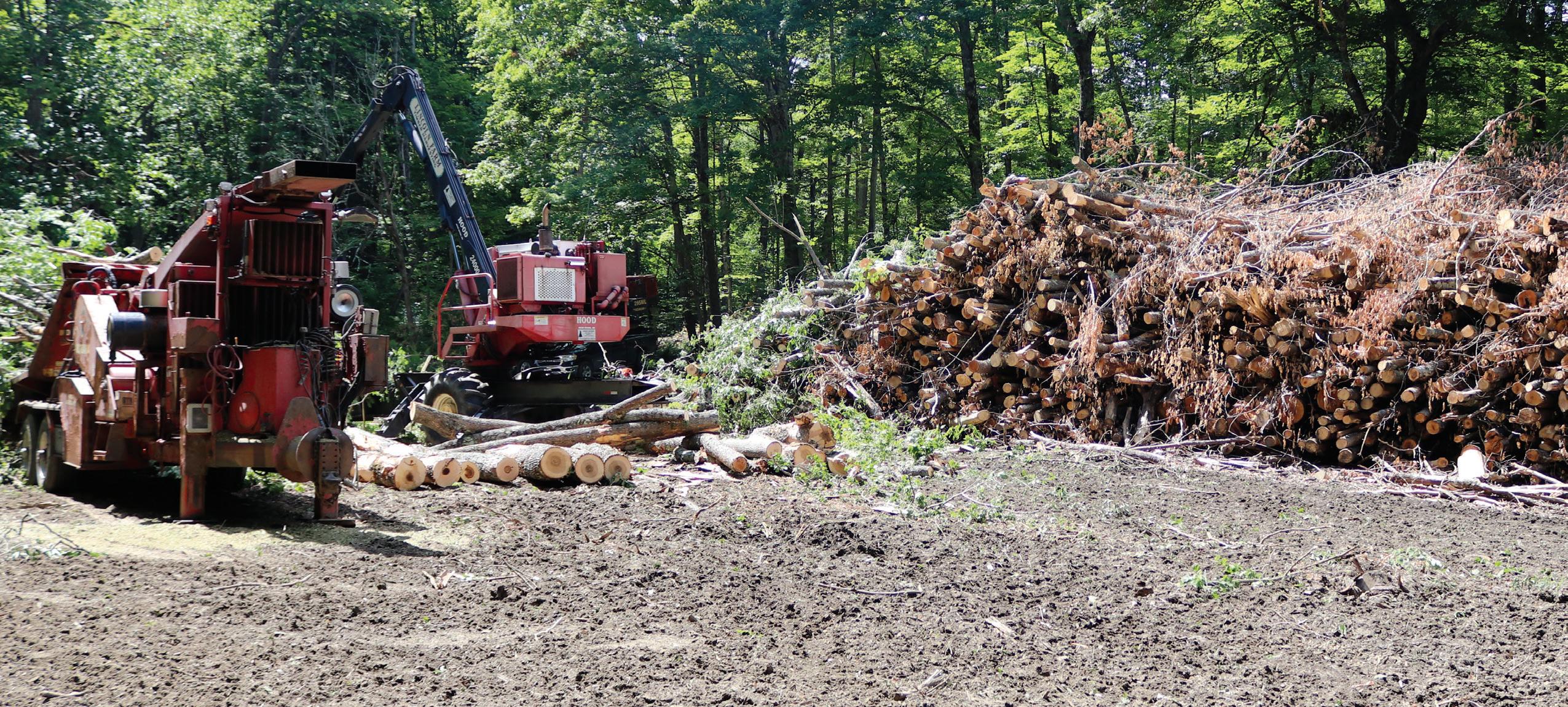
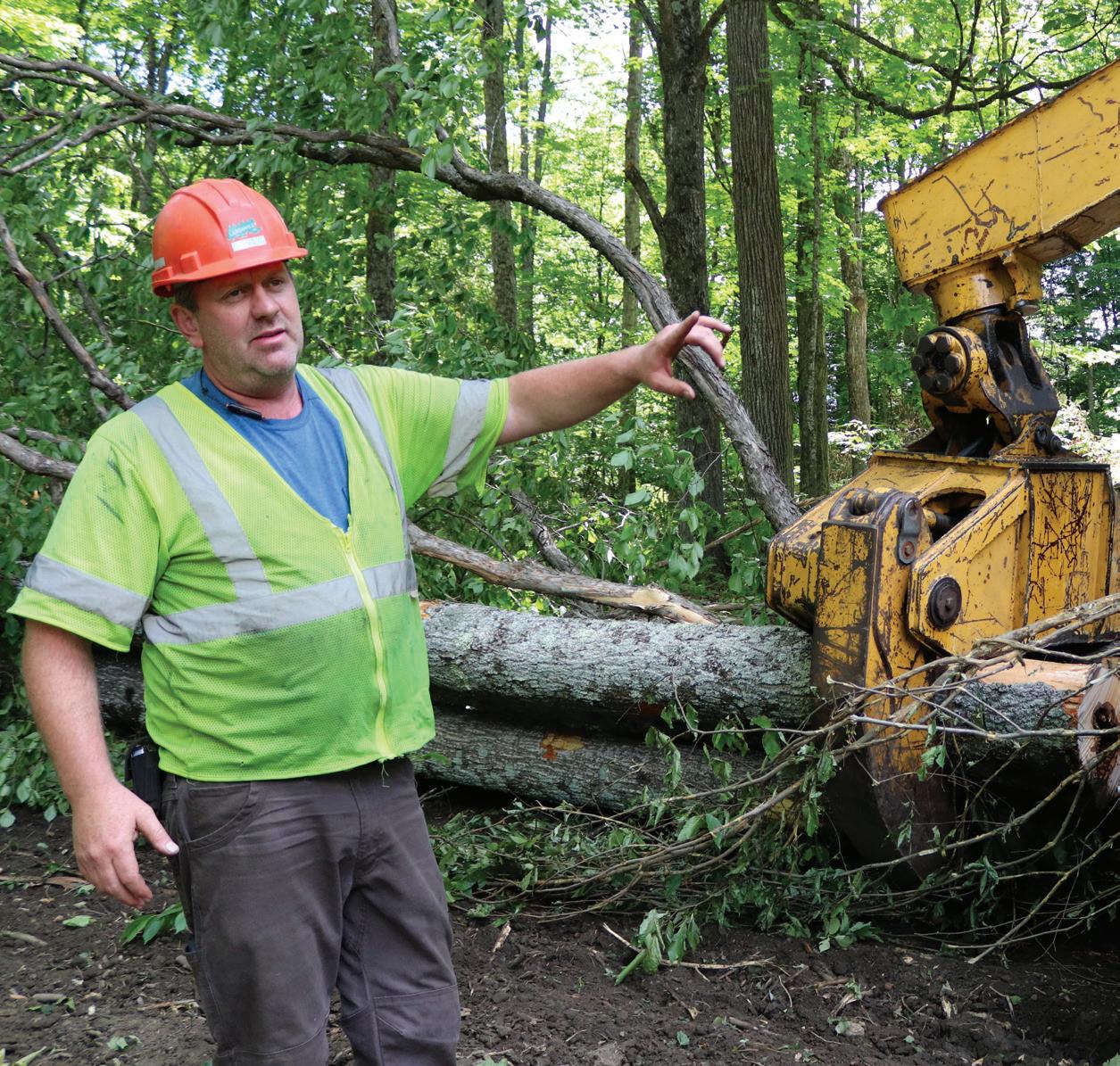
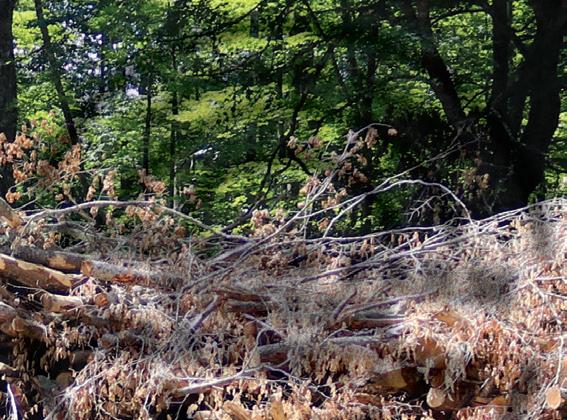

VERMONT COMPOST COMPANY, INC. MONTPELIER, VERMONT
Karl Hammer incorporated Vermont Compost Company in 1993 with the intention to make compost and compost-based soil mixes as a means of managing dairy manure and other compostable resources. The business has about 25 employees, and uses a mixture of dairy, equine and poultry manure, along with forest residuals and food scraps to make soil mixes suitable for organic greenhouse growers.
“When we started the business, we frequently had to explain what we meant by ‘compost.’ Nowadays, every pile of anything, anywhere, is labeled compost,” said Karl. “Each pile is different, and not every mixture is suitable media for every growing purpose.”
In addition to composting, Karl raises about 1,000 chickens and a few American Mammoth Jackstock donkeys — all have their purposes in the business. They sell the eggs, and chicken manure is used as a base in the compost. The donkeys are put to work hauling food scrap inputs from local businesses in the Montpelier area.
When Karl first began the business, it took him a few years to find a reliable source of credit. “Farm Credit really took the trouble to understand our business. It was the first lender that came out and wanted to understand what we were trying to do. Not everyone can acknowledge the value in our inventory,” he said, nodding to piles of manure.
The environmental impacts are very important to Karl as well. “I love to take a squandered resource and turn it into a product that is contributory to the profitability of my customers’ businesses,” he said. “Ultimately, growing food, land protection and soil preservation are important to me — this is an opportunity to participate in those efforts.”
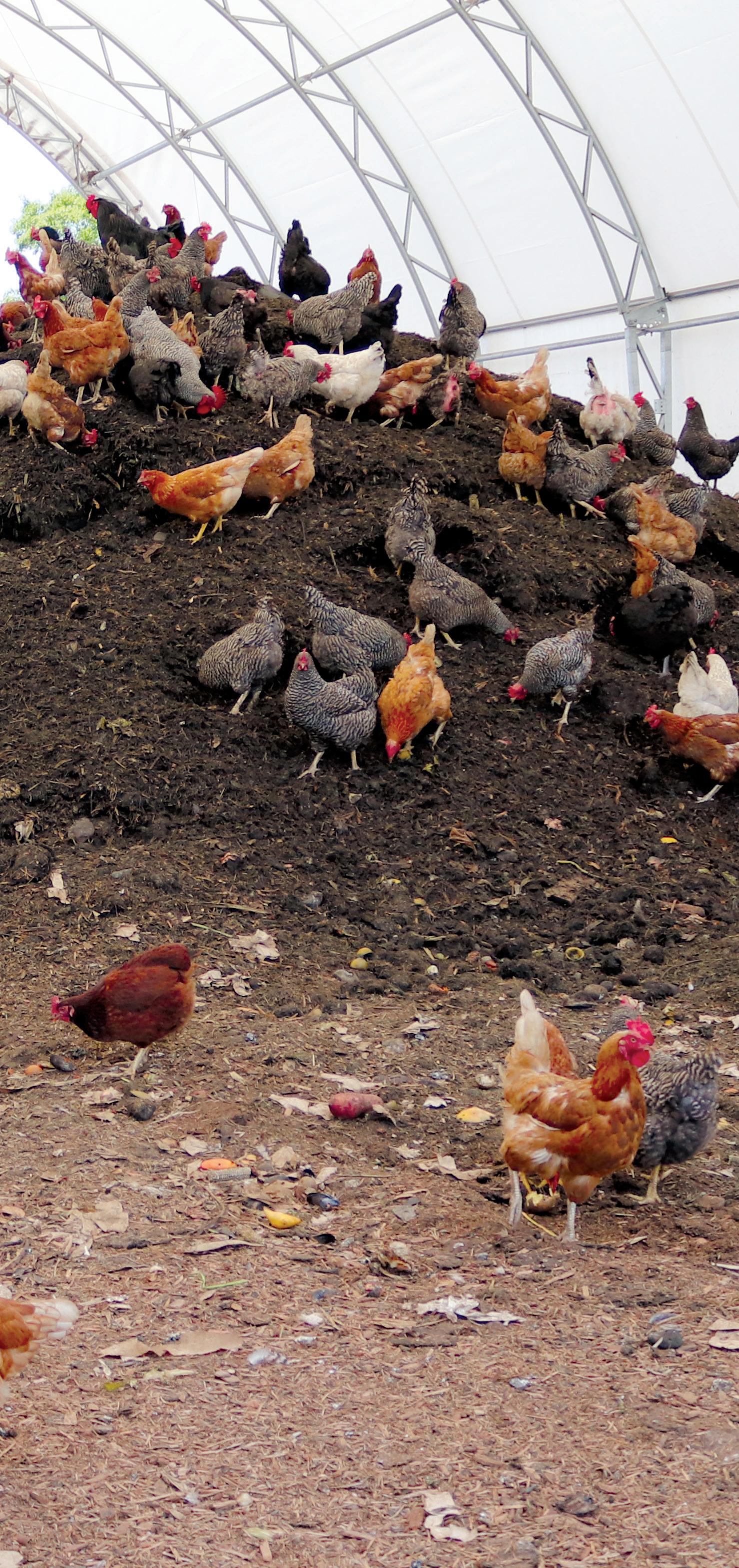
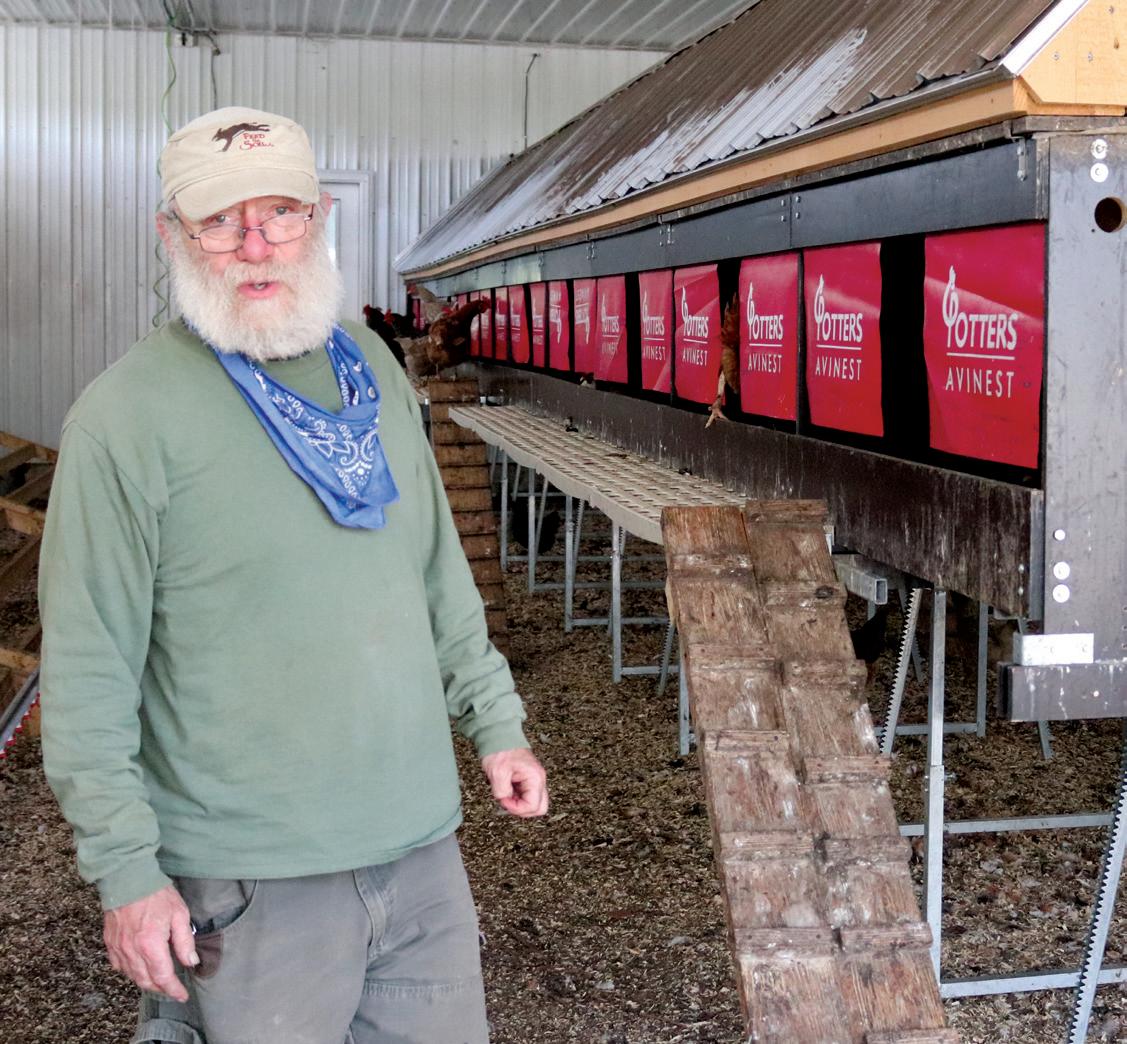



Fun fact: L F Hurtubise & Sons is right on the Canadian border! This marker stands at the end of the home farm’s driveway.
L F HURTUBISE & SONS, INC. RICHFORD, VERMONT

Maple tubing above the treeline.
Wayne Hurtubise and his brother, Hoyt, own and operate a 1,000-cow dairy across three locations — the farm the brothers’ father started in 1947 is home to the dairy; the original Hurtubise farm lost during the war era that was then bought back in 1998 hosts the calf facility; and the heifer facility is seven miles away in Montgomery, Vermont.
Over the years, the dairy has continued to evolve with the times. The dairy is on a collar system which utilizes artifi cial intelligence (AI) technology for its identifi cation system. They also inject all their corn ground to get more value out of the nutrients. Recently, they did a shrink study on their commodity sheds which resulted in implementing all bins last year. Their commodity sheds are now only used to store sawdust and hay.
The operation utilizes risk management crop insurance tools, including dairy revenue coverage and dairy margin coverage. “I think it’s a must with the volatility in the milk market,” said Wayne.
Wayne also spoke highly of his Farm Credit East loan offi cer, Chuck Custeau. “The Farm Credit team is super to work with. Chuck knows exactly what we’re doing, when we’re making an investment and he provides solid advice.”
L F Hurtubise & Sons has also diversifi ed their business to include maple, which has continued to be a growing sector of their operation. “It’s a nice side business that has done pretty well for us,” commented Wayne.
When asked what he likes most about being a dairy farmer, Wayne quickly responded, “Seeing things grow. Seeing the herd. We have our share of disappointments in this business, but there’s also so much satisfaction.”
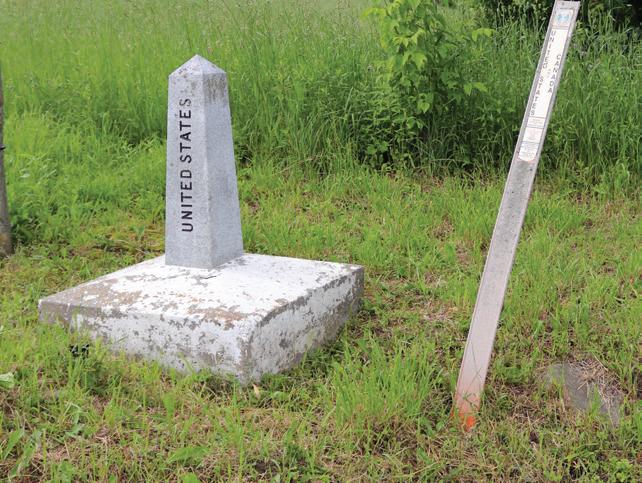
Meet some of the Northern Region team
MORGAN RILLING DAVE KEENAN
Regional Manager Senior Loan Offi cer I’ve had a lot of roles at Farm My grandfather had a farm Credit. I started out as growing up, so I always an intern; I’ve done payroll, records and taxes; thought I wanted to be a farmer. As I got older, my then made my way to being a loan offi cer, credit career path led me to banking, and for the last six operations coordinator, branch manager, and now, years I’ve really put those two interests together in regional manager. my work here at Farm Credit. I really enjoy being a partner to customer businesses. In my experience, farmers are much more than just Seeing the progression of their operations is very farmers. They’re bookkeepers, scientists, laborers, fulfi lling. It’s all about creating a partnership and planners — they do it all. Truthfully, I think farmers seeing the people and the businesses evolve. have a step up on most business owners in that way. On the days I have customer meetings, I always leave When I work with my customers, I really try to listen feeling good. Some meetings are tough, but if we can and learn. With the merger, some customers may help the customer in any way, I always get in the car have been concerned that we’d lose the in-person afterwards thinking, ‘That’s why I do what I do.’” ” element, but I haven’t lost any time with them. The new technology implementations might take me some time to learn, but once I do, I’ll have more opportunities to be out on the road. No matter what, I try to be open and let customers know I’m here — whatever they need, we can fi gure it out together. ”
ALICIA MARCY Tax Specialist
“ “ I grew up on a dairy farm, but my family later sold the cows. In 2018, I started working at Farm Credit as an offi ce assistant while fi nishing my degree in accounting. I’ve since switched to the fi nancial “ but my family later sold the services side of the business, focusing primarily on taxes. When it comes to interacting with customers, there’s no method that takes precedence. Some customers prefer in-person interaction, and others do everything remotely, whether it be via phone, email or screensharing. Whatever the customer needs, I do my best to accommodate. I like that I’m helping the next generation of farmers. The people I’m working with are people I know — they’re my community. It’s nice to be able to use my skills to give back to the community that I come from. 8 FINANCIAL PARTNER




